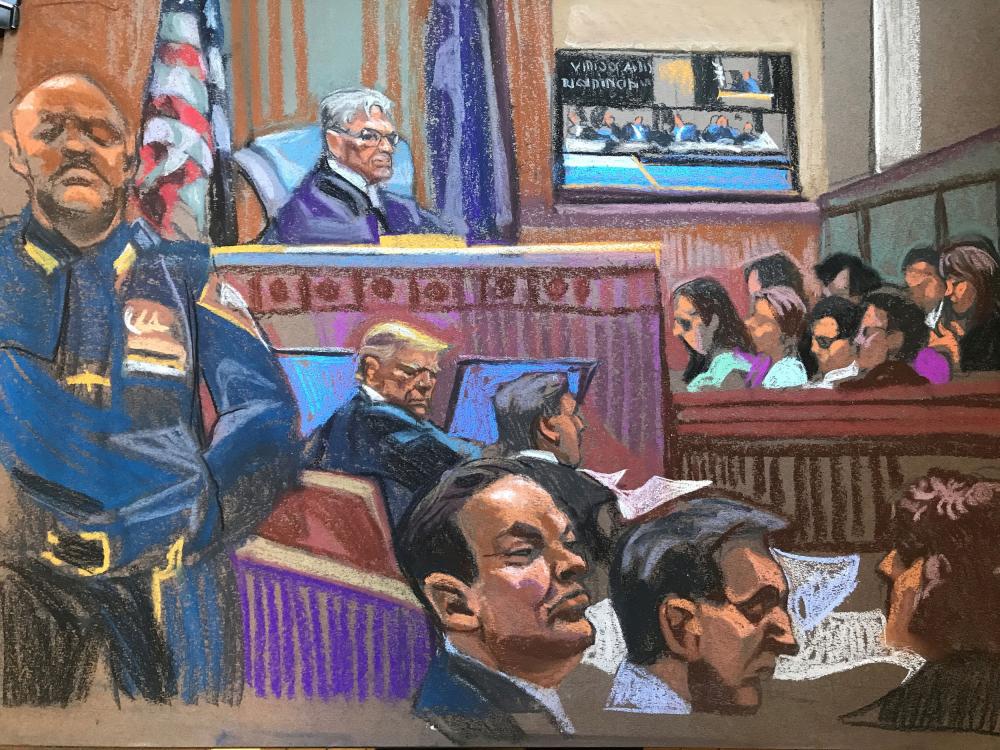As jury selection in Donald Trump’s criminal hush-money case started this week, it seemed like the former president would face a tough crowd. When Judge Juan Merchan asked the first group of 96 prospective jurors whether any thought themselves incapable of being be fair and impartial, more than 50 raised their hands.
These prospective jurors were excused from serving on the case, of course, but it still might have smarted for the real estate tycoon turned TV star turned America’s 45th president. New York is Trump’s home town, but it appears he’s so polarizing that his fellow citizens wanted an out.
Related: History in the making with debut of Donald Trump: criminal defendant
As jury selection has rolled on this week, it has been a surreal spectacle – and perhaps especially so for a man who was once the most powerful person in the world (and might be again). Trump has been forced to sit and listen as ordinary New Yorkers were asked their thoughts on him and America. The responses have been divided.
One prospective panelist did appear to make Trump’s morning on Tuesday. In response to question 36 on the selection questionnaire – “the defendant in this case has written a number of books. Have you read (or listened to audio) of any one or more of these books? If so, which ones” – he said yes.
“I read The Art of the Deal, and I want to say How to be Rich, and Think Like a Champion,” he hesitated, unsure as to whether this was the title. “Is that right?” Trump nodded his head and offered a smile.
When the first group of prospects was whittled down more, the prosecution and defense had an opportunity to question would-be jurors themselves. Colorful quips and quirky exchanges ensued.
“Resist the urge to flee the courtroom,” prosecutor Joshua Steinglass said, cautioning jury candidates not to agonize over why they, of all people, wound up as prospects on Trump’s trial.
“This case has nothing to do with your personal politics,” Steinglass told potential jurors. “It’s not a referendum on the Trump presidency or a popularity contest or indication of who you’re going to vote for in November. We don’t care.
“This case is about whether this man broke the law.”
Steinglass then asked would-be jurors about whether they would have an issue with their theory of the case – accessorial liability. That is, “if two or more people are acting together, they can each be held criminally liable … would anyone have a problem holding the defendant responsible for something his partner did?”
Steinglass gave an example by saying “say a husband hires a hitman to kill his wife”. The husband might not even be present when the hitman carries out this murder; would they have a problem finding the husband criminally responsible for her killing?
Trump’s attorney Todd Blanche conducted his own questioning of potential jurors, which boiled down to: what is your opinion of Donald Trump?
Some possible jurors seemed reticent about voicing an opinion while others didn’t seem all that perturbed by the former commander-in-chief’s antics. “I find him fascinating. He walks into a room and he sets people off, one way or another, and I find that really interesting. Really, this one guy could do all this?” one said.
Blanche responded, “Uhm, all right,” and then thanked him.
One potential juror repeatedly tried to avoid disclosing his opinion of Trump. “If we were sitting at a bar, I’d be happy to tell you, but in this room what I feel about President Trump is not important or inherent to either the case you’re presenting or you’re defending.”
After repeated prodding, he conceded: “Look: I’ll say I’m a Democrat, so there you go, that’s where it goes with me,” but, he insisted, “I walk in here and he’s a defendant.”
One woman appreciated Trump’s brashness. “He speaks his mind. Come on: what else can you say about that?” Trump smiled.
“He says what he wants to say,” she continued. “I want to say some things but my mother said, ‘Be nice.’”
Another voiced similar sentiments. “I don’t really care for the views, to be completely honest with you,” but “President Trump speaks his mind.” The aspirant said she would rather that over a politician who did not do so.
Later in the afternoon, Merchan warned Trumpagainst intimidating jurors in the court. Merchan said that Trump was “audible” when a potential juror was called to answer questions just feet from him.
“It was audible. He was gesturing and he was speaking in the direction of the juror,” Merchan said.
“I will not have any jurors intimidated in this courtroom,” Merchan warned. “Take a minute to speak to your client.”
Despite this snag, Tuesday afternoon suggested that things would move along efficiently. At the day’s end, seven jurors were picked.
Trump’s criminal hush-money trial: what to know
